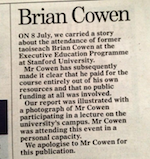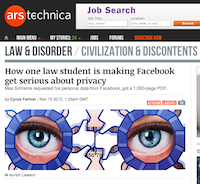Mobile and internet privacy
 In honour of European Consumer Day today, and World Day Against Cyber-censorship earlier this week, two privacy reports have caught my eye. Privacy is concerned as much with what we wish to keep private as it is with how we control what others do with our private data. Both reports cover both issues. First, the Article 29 Working Party (the co-ordinating group of EU data protection commissioners) have published an opinion addressing the key data protection risks of mobile apps (press release | opinion). Mobile devices increasingly store larger and larger amounts of personal data, and this poses many risks for individual privacy, both in terms of keeping the data private and secure, and in terms of what developers can do with the data collected by their apps. The Working Party recommend that all those in the app ecosystem should understand their own responsibilities, but they also acknowledge that, to achieve the highest standards of privacy and data protection, collaboration with other parties in the app ecosystem is necessary.
In honour of European Consumer Day today, and World Day Against Cyber-censorship earlier this week, two privacy reports have caught my eye. Privacy is concerned as much with what we wish to keep private as it is with how we control what others do with our private data. Both reports cover both issues. First, the Article 29 Working Party (the co-ordinating group of EU data protection commissioners) have published an opinion addressing the key data protection risks of mobile apps (press release | opinion). Mobile devices increasingly store larger and larger amounts of personal data, and this poses many risks for individual privacy, both in terms of keeping the data private and secure, and in terms of what developers can do with the data collected by their apps. The Working Party recommend that all those in the app ecosystem should understand their own responsibilities, but they also acknowledge that, to achieve the highest standards of privacy and data protection, collaboration with other parties in the app ecosystem is necessary.
Mobile apps are simply one of a plethora of modern technological challenges to privacy. Many of the others are addressed in a new UNESCO publication (cover pictured above left): Global survey on Internet privacy and freedom of expression.…






